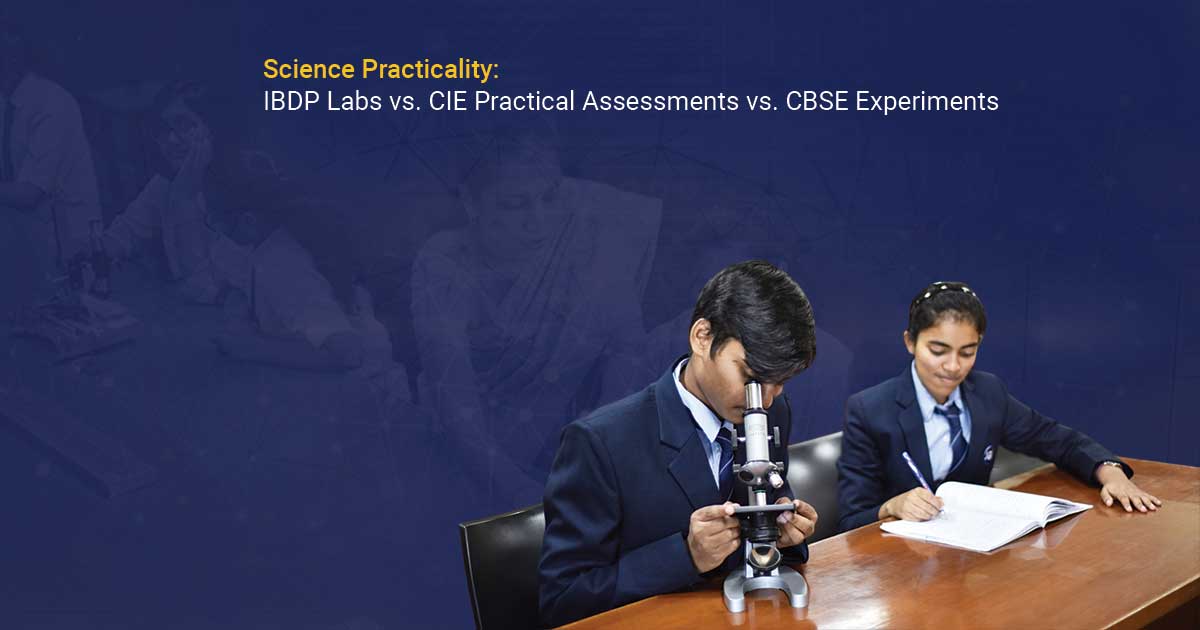

Research indicates that students retain knowledge and concepts better when they engage in hands-on learning during their schooling years. Performing experiments can result in up to a 90% knowledge retention rate, compared to just 10% for traditional lecture-based learning. A recent study also assesses that schools with active practical learning programmes have a 65% pass rate compared to schools relying on traditional teaching methods. Majority of teachers, exceeding 90%, agree that hands-on learning enhances students' abilities in problem-solving, critical analysis, and fostering innovation. These figures collectively pinpoint the significance of practical learning within a comprehensive school curriculum. Now, let's explore how the International Baccalaureate Diploma Programme (IBDP), Cambridge International Examinations (CIE), and Central Board of Secondary Education (CBSE) actively contribute to a well-rounded practical learning experience for students!
IBDP Labs
The IBDP offers a complete range of academic programmes, including six subject groups, a theory of knowledge (TOK) course, an extended essay (EE), and creativity, activity, and service (CAS) activities. Practical learning in the laboratory is an important component of the IBDP curriculum, requiring 40 hours for Standard Level (SL) and 60 hours for Higher Level (HL) subjects. The students are required to conduct experiments and practical work in these subjects. Here's a brief overview of how labs may be structured in some of the common IBDP science subjects:
IB Labs: Grading and Evaluation
IB science lab reports are evaluated based on five distinct criteria, namely, design, data collection and processing, conclusions and evaluation, manipulative skills, and personal skills. Lab reports typically require the completion of two to three sections, although some may require assessment across all five criteria. Each criterion is divided into components, and teachers assign scores ranging from 0 to 6 (c, p, or n) based on how well students meet these aspects. In the senior year, scores across the five criteria are reviewed. The top two scores from design, data collection and processing, and conclusions and evaluation are combined with scores from manipulative skills and personal skills to determine the final internal assessment mark, with a maximum possible lab score of 48. Additionally, lab work contributes to the standard course grade using the Prince William County grading scale. Students receive a second grade for each lab, along with information about point values for other assessments contributing to their overall course grade.
CIE Practical Assessments
The CIE conducts practical assessments as part of their curriculum, forming a crucial component of science and other subjects. These evaluations enable students to showcase their practical aptitude, proficiency in laboratory procedures, and grasp the subject matter in depth. The central aim of practical assessments is to appraise a student's practical competencies and their capacity to execute experiments, scrutinise data, and formulate conclusions. Here's an overview of the CIE practical assessments covered in the International General Certificate of Secondary Education (IGCSE), Advanced Subsidiary (AS), and Advanced (A) levels:
CIE Practical Assessment: Grading and Evaluation
Students are required to perform experiments or investigations in a laboratory setting, followed by data analysis using calculations, graphs, and written explanations. A critical aspect of practical assessments is the preparation of written reports, covering the details of the experiment and drawing conclusions. CIE provides clear assessment criteria for practical assessments on the basis of students’ practical skills, ability to follow instructions, data interpretation, and presentation. Teachers apply the assessment criteria provided by CIE to evaluate the practical work and written reports. These criteria often use a scale that differentiates between levels of performance, such as 'excellent,' 'good,' 'satisfactory,' and 'needs improvement.'
CBSE Experiments
CBSE emphasises laboratory work as a crucial component of the curriculum, particularly in science subjects. The curriculum aims to promote hands-on learning and practical skill development in addition to theoretical knowledge. The diverse lab exposure in a CBSE school allows the students to perform a variety of experiments to understand and apply the principles of science. Here's an overview of CBSE laboratory work:
CBSE Experiments: Grading and Evaluation
The CBSE provides specific assessment criteria and guidelines for each practical examination. These criteria are designed to evaluate different aspects of a student's practical work, data collection, analysis, and report writing. The teachers closely monitor and evaluate students' performance during the practical sessions. They assess each student's performance in different areas, and based on their assessment, they assign grades or marks to students' practical work and written reports. The grading scale may vary depending on the specific CBSE programme and level. However, in most cases, practical marks usually constitute 30–40% of the overall marking scheme of the subject.
Final Thoughts
Practical learning is a cornerstone of educational success because it equips students with essential skills, preparing them for future academic and professional endeavours. IBDP labs encourage students to challenge their beliefs, appreciate diverse viewpoints, and develop critical thinking and risk management. CIE practical assessments gauge a student's experimental aptitude, and CBSE’s laboratory work fosters hands-on learning and practical skills. Through specific assessment criteria, teachers evaluate students' practical work and empower students for real-world challenges.
Recent Blogs
IGCSE Full Form
What is the International Baccalaureate?
IBDP Full Form
CIE Board Full Form
CBSE Full Form
Site Designed and Maintained By : Office of Communications, JAIN Group All rights reserved.